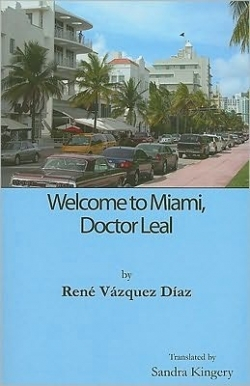
Welcome to Miami, Doctor Leal
Cuban-American Dr. Otto Leal’s return from Sweden to his home city of Miami is doomed before it begins. Things are already bad enough for the doctor. His brother, Samuelito, has died under mysterious circumstances, prompting this long-delayed visit home. Days before his departure, Leal’s wife announces she is divorcing him and taking their children with her. His mother, who he has not seen in years, is slipping fast into senility while his remaining brother, Jorge, is so embittered by Leal’s absence he gives Leal the wrong dates for Samuelito’s funeral
Add to this cast of characters the men who detained Leal at the airport to interrogate him about his academic visits to Cuba, and who follow both his personal and professional life with startling interest and accuracy.
Through the eyes of a returned prodigal son, author René Vázquez Díaz journeys through modern Miami to explore the tangled history of Cuban-American relations, and locates the intersection of past and present in one hapless Leal. Leal has led an exemplary life: He rose from a working-class family to become a world-renowned pediatric neurosurgeon, he lectures all over the globe, and he has even volunteered his services to Doctors Without Borders in impoverished countries. Now, however, it seems his good deeds and intentions are what lands him in trouble with the US authorities.
As Leal’s personal life falls apart, another set of problems manifest: shadowy figures who follow him, moonlight meetings, cryptic pass-phrases, and increasingly strange demands. Leal finds himself enmeshed in the surreal drama of a spy thriller in which his innocent actions now damn him. Meanwhile, his problems of the family and of the heart, and the mystery surrounding Samuelito’s death, are no closer to being solved.
Vázquez Díaz excels at balancing political and personal elements, as when Leal takes his mother on a tour of a Cuban museum where she confuses a stranger with a lost love. As a result of this craftsmanship, the discourses on the Cuban Revolution, the Bay of Pigs, and the new post-9/11 political climate in America do not seem heavy-handed, but a natural part of the story. As the novel progresses, it becomes clear that understanding the political past and chaotic present may be the only way for Leal to escape Miami with his freedom intact.
At one point, Leal asks his mother’s aide and his new love-interest, Melina, if there are any guns in the house. She replies: “Guns? No, Doctor, there are people in this house. And they’re all wounded.” Thus she encapsulates the entire novel, full as it is with wounded characters. The pleasure is in watching someone as wounded as Leal struggle against the odds as he finds his way to heal.
Reviewed by
Michael Beeman
Disclosure: This article is not an endorsement, but a review. The publisher of this book provided free copies of the book and paid a small fee to have their book reviewed by a professional reviewer. Foreword Reviews and Clarion Reviews make no guarantee that the publisher will receive a positive review. Foreword Magazine, Inc. is disclosing this in accordance with the Federal Trade Commission’s 16 CFR, Part 255.
